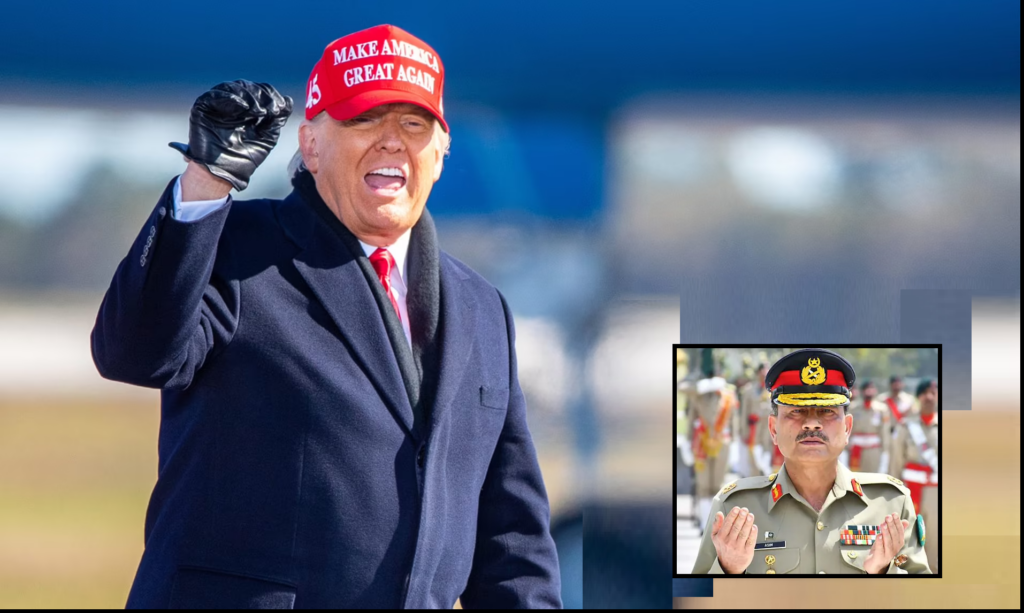
- The United States’ enduring fascination with Pakistan isn’t a new phenomenon; it has been a consistent feature of their relationship since Pakistan’s inception.
- While the U.S. champions the rule of law, its interests in Pakistan often lead it to deal with whatever regime is in power, regardless of its democratic credentials.
- The primary reason for this U.S. posture is that Pakistan is a strategic ally, and many of the Pakistani military assets destroyed by India, including those at Sargodha, were supplied by the U.S.
The United States’ enduring fascination with Pakistan isn’t a new phenomenon; it has been a consistent feature of their relationship since Pakistan’s inception. That creation was a long-term plan by the Euro-Atlantic powers to use Pakistan as a satellite state against India, ensuring geopolitical access and visibility in the region. The very idea behind Pakistan’s formation was to keep an eye on India and use Pakistan against it.
Now, after decades, this project is clear to everyone. For years, the United States has supplied military arsenal to Pakistan’s dictators. While the U.S. champions the rule of law, its interests in Pakistan often lead it to deal with whatever regime is in power, regardless of its democratic credentials.
This became evident in the recent statement by former U.S. Secretary of State Mike Pompeo, who revealed that during his tenure (2016–2020), when the India–Pakistan conflict erupted in 2019 after the Balakot airstrike, the U.S. chose to deal with Pakistan’s military rather than its civilian government. This confirmed that Pakistan is military-controlled.
There was a false tendency being created in the diplomatic circuit of India, where it was believed that whenever Republicans come to power in the United States of America, the defence relationship between India and the United States improves and many believed as during the Trump administration (2016–2020), defence understandings such as LEMOA and COMCASA were signed, but in reality, there is a bipartisan consensus in Washington on Pakistan’s utility against India. Regardless of which party governs, U.S. interest in Pakistan remains high.
The recent escalation during Operation Sindoor showed this clearly. For India, it is a reminder that American affection for Pakistan remains strong. Those who believe the U.S. is India’s strategic partner must reconsider. America will always maintain friendly ties with Pakistan.
India never requested U.S. mediation with Pakistan. Yet, during India’s strikes on Pakistani targets, President Trump suddenly claimed he had ended the war. Prime Minister Modi and External Affairs Minister S. Jaishankar have repeatedly clarified there was no mediation and no request for it.
Many experts have opined that the primary reason for this U.S. posture is that Pakistan is a strategic ally, and many of the Pakistani military assets destroyed by India, including those at Sargodha, were supplied by the U.S. The Indian Air Force Chief A.P. Singh has said that India destroyed six Pakistani fighter jets, including a US-supplied F-16 fighter jet.
President Trump’s actions were also driven by his desire to be seen as a “peace president.” He often seeks geopolitical conflicts where he can suddenly declare himself the one who resolved them, boosting his status and projecting U.S. power. His shifting positions have led to growing differences with India, especially after India firmly rejected all mediation efforts. Trump wanted public appreciation from India, and when he did not get it, he was displeased.
Since Operation Sindoor, Pakistan’s so-called Field Marshal Munir has visited the U.S. twice, likely to encourage American pressure on India to negotiate. Around the same time, Trump imposed tariffs on many countries, with India being the second-worst hit after Brazil. Both were hit by 50%.
Although Trump claims the tariffs are for economic reasons, they are politically motivated. He cites India’s oil imports from Russia, yet China—Russia’s largest crude oil importer—was given a 90-day delay on tariffs. This shows the targeting of India is political, linked to its refusal to accept U.S. mediation claims.
The U.S. will always keep Pakistan as a tool to pressure India whenever relations with the West sour. Since Pakistan lacks strong national interests of its own, it is easy for the West to use it. We should expect more cooperation between the U.S. and Pakistan, all aimed at countering India. India should continue engaging with the United States, but must follow its path and reject any pressure to accept false mediation.
Aayush Pal is a freelance writer on contemporary geopolitical developments. The views expressed in his work are entirely his own.
